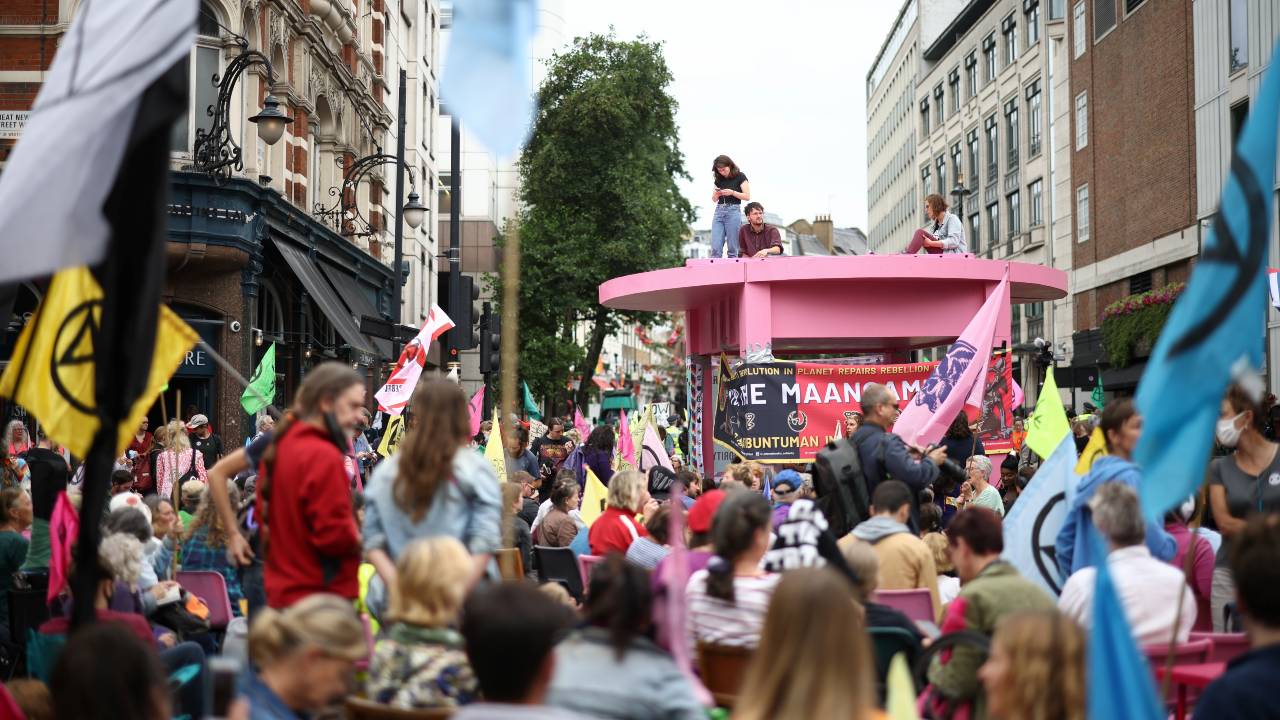
Extinction Rebellion activists have returned to the streets of London. /Henry Nicholls/Reuters
Environmental activists from Extinction Rebellion (XR) have occupied a junction in one of London's busiest tourist destinations, kick-starting what the group has promised to be a two-week campaign of "disruptive" protests in the UK capital.
After a relatively quiet summer, XR activists were once again out in force in central London on Monday, with thousands gathering in Trafalgar Square early for the "opening ceremony” of its latest action, which it has named "impossible rebellion."
In scenes reminiscent of the group's first action in London two years ago, the protesters then moved to a busy intersection in the popular theater district of Covent Garden where they blocked roads, chained themselves together and quickly mounted a makeshift camp.
READ MORE
Can we eradicate poverty?
The Taliban is 'the people's choice'
The spoon revolutionizing meals in space
This year, the fortnight of protests will center on the capital's financial district, which XR says is helping fuel climate change despite the environmental consequences.
"The City of London is the arch financier of the carbon economy. It supports 15 percent of global carbon emissions," lawyer and XR activist Tim Crosland told reporters.
He added: "It hosts BP, Shell, Glencore, Anglo American and Russian oil and gas companies such as Gazprom and Rosneft. It's time that people understand the real contribution of the UK to this crisis."
The planned protests – which come ahead of talks on climate change involving world leaders in Scotland in November – will include site occupations and marches through the capital.

XR activists first occupied sites in central London in 2019. /Henry Nicholls/ Reuters
XR has regularly staged such demonstrations across Britain targeting financial institutions, banks, energy firms and media organizations and says it expects thousands of activists to join the fortnight of daily actions.
However, two years since XR activists first caused traffic to grind to a halt for 11 days at some of the capital's most congested roads – in some cases, causing a fierce backlash from both politicians and commuters – the group finds itself in a very different world.
Not only is its new campaign being launched in the middle of a restrictive global pandemic, the causes and consequences of which are inextricably linked to climate action, it's also the group's first action in the wake of a catalogue of shocking environmental disasters in Europe that have only added urgency to XR's message in London.
There has been a significant increase in support for green action over the past two years, according to new data from Ipsos MORI, with one of its UK polls showing 56 percent of respondents wanted the country to reduce its emissions at a faster rate in order to set an example to other countries.
In a separate YouGov poll, 34 percent of UK participants said the environment was currently the most important issue facing the country.
XR's demands, of an emergency response to climate change from governments and a mass move away from polluting industries to avert the worst scenarios outlined by scientists, are becoming more mainstream as well as more urgent.
But with fewer commuters on London's streets and a far stricter government response to public demonstrations amid COVID-19, the question is whether this round of protests will have the same impact as before?
Source(s): Reuters
 简体中文
简体中文





